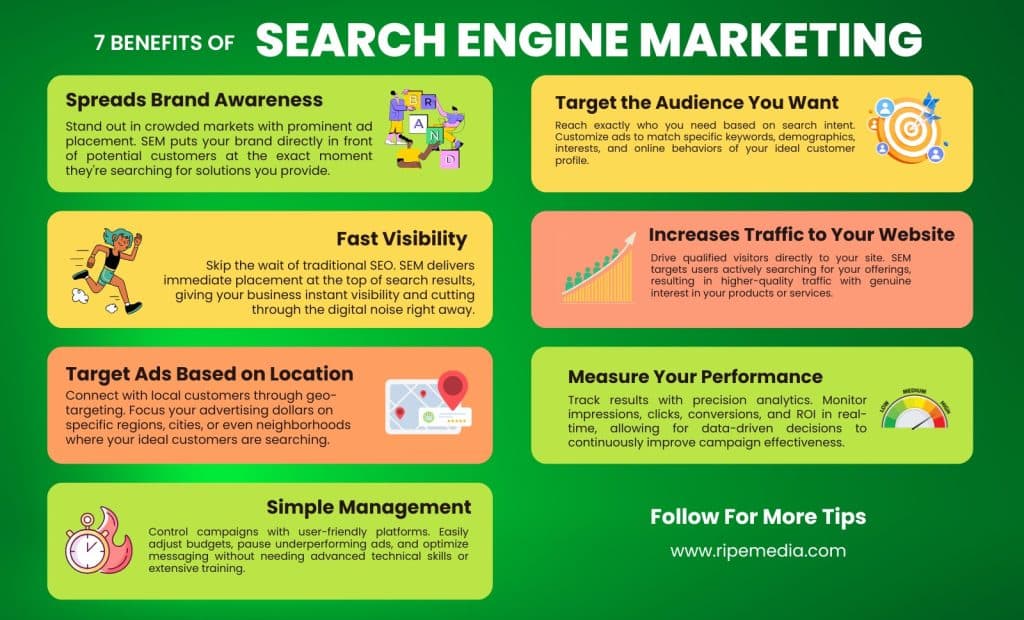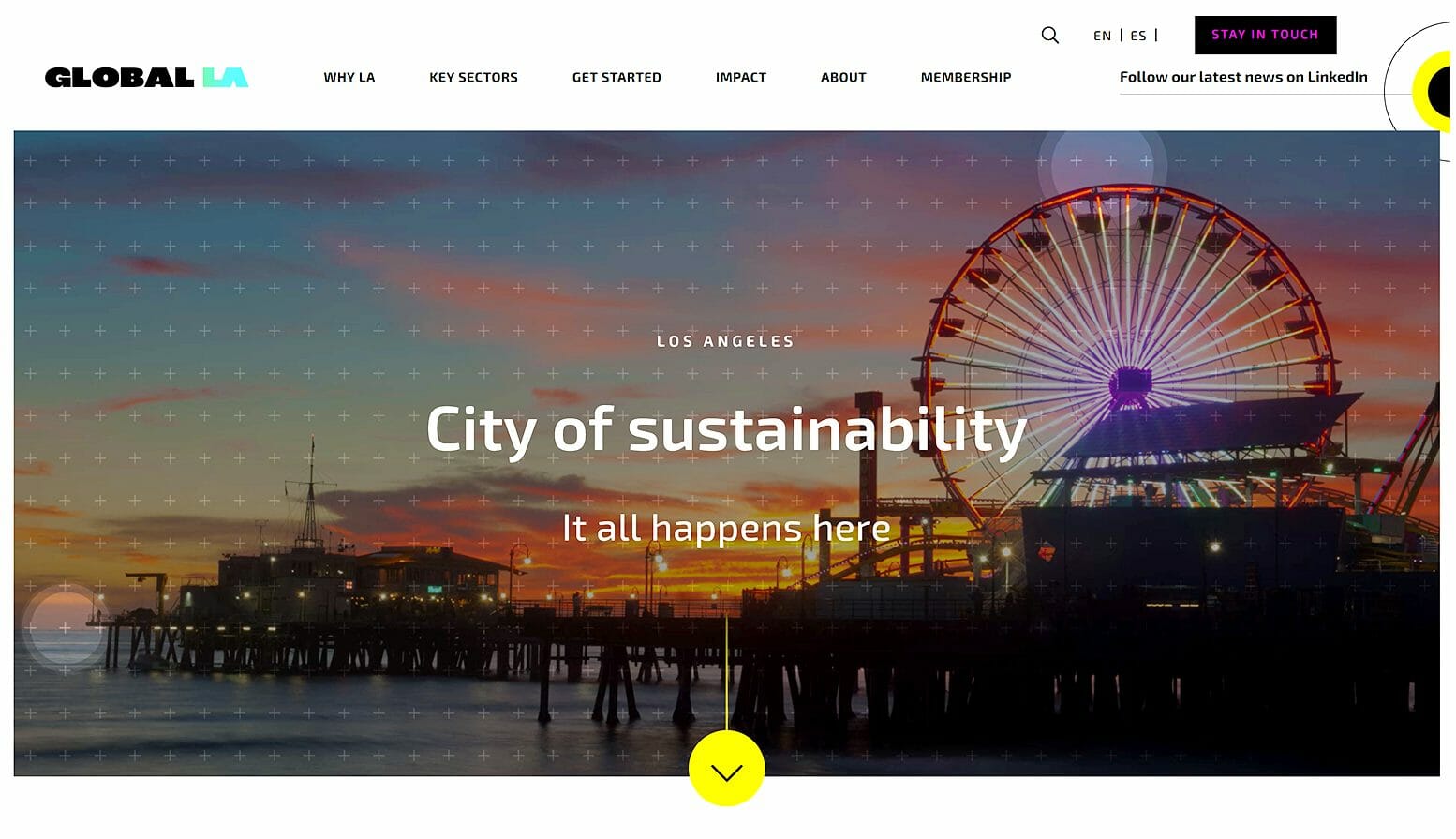7 May ‘21
7 Impressive Benefits of Search Engine Marketing
7 May ‘21
In: Marketing, / By: Ripe Admin
Did you know Google processes a staggering 8.5 billion searches every single day? That’s billions of opportunities for people to discover businesses just like yours. If you’re not tapping into the power of search engine marketing, you’re leaving an enormous amount of potential exposure on the table.
But here’s the thing—search engine marketing isn’t just about visibility. It comes with a host of other benefits that can transform how your business connects with customers. In this article, we’ll dive into why Search Engine Marketing (SEM) matters and explore the advantages of running a well-executed campaign.
First, though, let’s break down what SEM actually is and why it’s important.
Key Takeaways
- Immediate Visibility: SEM provides instant access to prominent positions on search engine results pages, unlike Search Engine Marketing (SEO) which requires long-term planning and slow progress.
- Targeted Audience Reach: Search engine marketing allows you to precisely target potential customers who are actively searching for your products or services, making them already primed to purchase.
- Measurable Results: SEM platforms like Google Ads provide instant access to performance data including top-performing keywords, impressions, and click-through rates, allowing you to quickly adjust strategies for better effectiveness.
- Brand Awareness: The paid ads used in search engine marketing can help your brand cut through competitive noise and leave lasting impressions on customers.
- Cost-Effective Marketing: With pay-per-click models, you only pay for ads that work, making SEM more efficient than traditional advertising methods like billboards or sponsorships.
- Flexible Implementation: SEM works for businesses of all sizes with scalable budgets and targeted campaigns customized to your specific needs.
- Competitive Advantage: With around 60% of online searchers only looking at the first page of search results, SEM helps you secure valuable positioning to improve your online performance.
What Is Search Engine Marketing?
Search engine marketing is all about leveraging search engine results to promote your website. At its core, it revolves around strategically placing paid advertisements on search engines. You’ve seen them—those ads sitting right at the top of your Google search results? That’s SEM in action.
What sets SEM apart from other marketing strategies, like search engine optimization (SEO), is its focus on immediate visibility through paid placement. This differs from SEO, which takes a organic approach, building traffic naturally over time. But here’s the secret: SEM and SEO aren’t rivals—they’re teammates. When used together, they form a powerful one-two punch that drives traffic and boosts your online presence.
Seven Benefits of Search Engine Marketing
Now that we’ve answered the question, “What is SEM?”, let’s explore some of the benefits of SEM. These advantages shine brightest when the tools and strategies are used effectively.
While it’s entirely possible to run a campaign on your own, partnering with an experienced professional can help you achieve results more efficiently and maximize your impact in less time. With the right expertise, you can skip the learning curve and start reaping the benefits sooner.
Thinking about launching an SEM campaign or have questions about how it can work for your business? Let us know how we can help—just drop us a line below!
1. Spreads Brand Awareness
The paid ads used with search engine marketing can help your brand cut through the noise of competition. Whether it’s the headline or URL link, these types of ads can leave a lasting impression when it comes to customer’s impression of your brand.
When combined with other forms of brand awareness it can slowly or quickly put you on your target audiences’ radar. If you want some other ways to increase brand awareness for your company, then check out our guide here.
2. Fast Visibility
Creating visibility through organic SEO takes time and energy. Search engine marketing on the other hand provides almost instantaneous results. Your ad is placed in front of your potential customer as soon as they search for you. This makes it an ideal short-term strategy for quickly creating visibility for your products, service, or organization.
3. Can Target Ads Based on Location
Another big plus associated with SEM is that you can set up your ads to only target people near the vicinity of your business. This helps you filter out searchers who are too far from your location.
It also helps connect you with people in your area. Local audiences are eager to find businesses in their area. Maybe that’s why search results for ‘near me’ and ‘where to buy’ queries have grown by 200% on Google over the past two years.
4. Simple Management
Another attractive benefit of search engine marketing is simplicity. Platforms like Google Ads make it easy to both create and manage any ads that you use through the service.
For example, you can create schedules for different ads, allowing them to run or stop for however long your budget allows. This type of scheduling makes sure that you get the most out of your ads before deciding to end them.
5. Easy to Target the Audience You Want
As we mentioned, search engine marketing allows you to target users that live in a certain location near your business. However, this isn’t the only way that SEM can help put you in front of your ideal audience. Different age groups, races, and socioeconomic groups use different keyword searches.
As such, utilizing the keywords in your ads can help put you in touch with the customers more likely to engage with your brand. For example, let’s say you want your ad to target a young, Gen Z audience. You can find out what keywords they’re searching for, then target them with relevant content.
6. Increases Traffic to Your Website
The ads for your website are often the first thing that users see when they search for relevant interests. If your ad copy is effective, then this can drive traffic to your website.
This is especially helpful if you’ve been having trouble generating traffic organically through SEO. If utilized properly, the paid advertisements will help supplement traffic until you begin to generate it more naturally on your own.
7. Allows You to Measure Your Performance
Measuring the effectiveness of ad campaigns in real life is often a difficult and costly experience. They require things like surveys, focus groups, and similar metrics. Luckily SEM platforms like Google Ads give you instant access to information like top-performing keywords, impressions, and click-through rates.
This is one of the best advantages of SEM over traditional advertisements. These tools allow you to measure the performance of your ads. If you notice that one ad does better than another, then you can quickly adjust your strategy and run more effective search engine ads.
How Does Search Engine Marketing Work?
Search engine marketing (SEM) works by placing paid advertisements on search engine results pages (SERPs) when users search for specific terms related to your business. The process involves selecting relevant keywords, creating compelling ad copy, setting bids for how much you’re willing to pay per click, and optimizing landing pages for conversions.
The most common SEM platform is Google Ads, which uses an auction system where advertisers bid on keywords. However, your ad position isn’t determined by bid amount alone—Google also considers quality score, which evaluates ad relevance, expected click-through rate, and landing page experience. This ensures users see helpful ads that match their search intent, not just those from the highest bidder.
SEM differs from search engine optimization (SEO) by focusing on immediate visibility through paid placement, whereas SEO takes an organic approach to building traffic naturally over time.
A comprehensive digital marketing strategy often employs both approaches to maximize online presence.
According to search marketing experts, successful SEM campaigns require continuous monitoring and optimization to improve performance metrics like conversion rates, cost-per-click, and return on ad spend.
Need Help With Search Engine Marketing? Contact RIPE
We hope this article helped you learn about some of the benefits of search engine marketing. As you can see, a successful SEM campaign can bring numerous advantages to your business. However, it’s important to have someone in charge that knows what they’re doing. So how do you find this type of expert?
If you live in the California area, then look no further than Ripe Media. We’re a full-service design and marketing agency. We utilize SEM, as well as a variety of other marketing and communications strategies, to ensure that your business gets the exposure it deserves. Don’t take our word for it — contact us today and find out how Ripe Media can help your company today.
Frequently Asked Questions About Search Engine Marketing
What is search engine marketing (SEM)?
Search engine marketing (SEM) is a digital marketing strategy that uses paid advertisements on search engines like Google and Bing to increase website visibility and drive targeted traffic.
How does SEM benefit my business?
SEM delivers immediate visibility, targeted audience reach, increased website traffic, and measurable ROI, making it an effective marketing tool for driving qualified leads and sales.
What’s the difference between SEM and SEO?
While SEO focuses on improving organic search rankings through website optimization, SEM involves paid advertisements that appear at the top of search engine results pages for immediate visibility.
Is SEM only for large businesses?
No, SEM works for businesses of all sizes, with flexible budgets and customizable targeting options that can be tailored to your specific business goals and resources.
How do I measure SEM success?
SEM platforms provide comprehensive analytics to track key metrics like impressions, clicks, conversions, cost-per-click, and return on ad spend, allowing for data-driven optimization.
How do I start with SEM?
Start by defining your goals, researching target keywords, creating compelling ad copy, setting a budget, and launching your campaign using platforms like Google Ads or Microsoft Advertising.
















